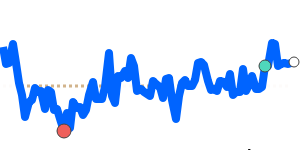USD/HUF Outlook:
The USD/HUF is slightly weaker but likely to move sideways as the rate is below its recent average and near recent lows. Geopolitical uncertainty and strong US job data continue to support the USD, but lack of a clear driver for movement in the HUF keeps the exchange rate stable.
Key drivers:
• Rate gap: The Federal Reserve's interest rate environment is more favorable compared to the Magyar Nemzeti Bank's efforts to maintain high rates to control inflation.
• Risk/commodities: The ongoing geopolitical tension keeps demand for safe-haven currencies like the USD elevated, while the HUF lacks similar support.
• One macro factor: Hungary's recent inflation drop has not completely alleviated pressure, as the core inflation remains above the central bank's target.
Range:
Expect the USD/HUF to drift within its recent range, maintaining a relatively stable position amid the current uncertainty.
What could change it:
• Upside risk: A strong US producer price index report could further strengthen the USD.
• Downside risk: Increased political uncertainty in Hungary ahead of upcoming elections could weaken the HUF further.

